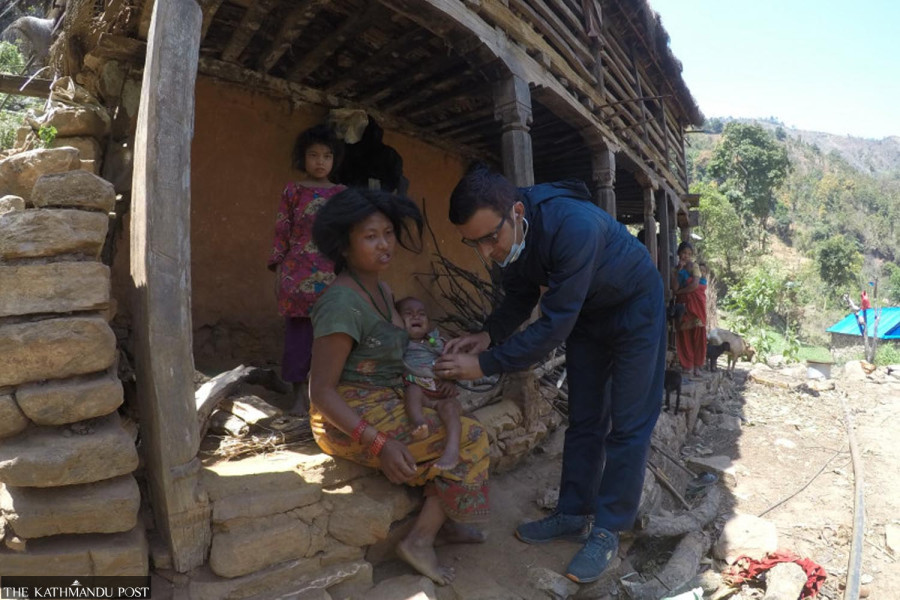Health
Nepal struggling to control measles
Experts say outbreak in Nepalgunj could be a proxy, suggesting inadequate vaccination.
Arjun Poudel
The outbreak of measles virus started from Ward-5 of the Nepalgunj Sub-metropolitan City and has by now spread to 17 wards and the nearby Khajura Rural Municipality. Health Officials at the Sub-metropolis said 190 cases of infection have been confirmed until Tuesday afternoon. They also conceded that hundreds of other cases could be in communities as all cases of infections generally do not get reported.
What concerns child health experts and immunisation specialists in Nepal is the outbreak of measles virus in Nepalgunj Sub-metropolitan City could be an indication of the low coverage rate of the overall vaccination programme.
“Forget about the elimination of the measles virus from the country,” said Dr Shyam Raj Uprety, former director general of the Department of Health Services. “We are even struggling to control the outbreak spreading uncontrollably in communities in Nepalgunj.”
Measles is a contagious disease transmitted through fluids from the nose, mouth or throat of infected persons and through air. The virus infects the respiratory tract, then spreads throughout the body. It remains a big cause of death among young children globally, despite the availability of a safe and effective vaccine, according to the World Health Organisation.
Nepal had committed to eliminating measles by 2023. To declare measles as eliminated, the number of cases should be less than five in every one million people throughout the year.
Experts say the massive outbreak of the deadly disease at the start of the new year shows that the country is nowhere near its elimination target.
“Outbreaks of measles virus in big cities and accessible areas indicate that we have to revamp and intensify our vaccination programme,” said Uprety. “Now it has been clear that there are loopholes and gaps in Nepal’s vaccination programme, which must be addressed at the earliest.”
Health officials serving in Nepalgunj Sub-metropolis concede low coverage rate of the measles vaccine, as most of the infected children are either unvaccinated or have not taken their full dose of the vaccine.
“We have started administering measles vaccines to all children between six months to 15 years in all 23 Wards of the sub-metropolis,” said Rajan Shahi, an official at the sub-metropolis.
“After the outbreak of the measles virus, people seeking vaccination have also increased in areas where the vaccination coverage rate was low.”
More than 22,000 children of the said age group have already been administered with the measles vaccine after the outbreak.
Low vaccination coverage, internal migration, lack of public awareness on the importance of vaccines and government’s apathy are the reasons ascribed to regular outbreaks of measles in the districts, according to health experts.
Officials say most measles outbreaks have been reported among the marginalised and religious communities—Muslims and Catholics—as well as other backward groups where the level of awareness of regular immunisation is low.
“Coverage of other health programmes is also low in our areas and for that, several factors are responsible,” said Ram Bahadur Chand, chief of Health Division at the sub-metropolis. “We are preparing to launch mass drug administration to control lymphatic filariasis or elephantiasis and it will be the 13th consecutive year.”
Most of the districts throughout the country controlled lymphatic filariasis from five years’ mass drug administration programme, but the mosquito-borne parasitic disease has not come under control in Banke and a few others districts.
Experts say the problems in vaccination might include quality of vaccine, cold chain management, transportation, administration of vaccine and lack of awareness.
“The time has come to review the loopholes in vaccinations,” said Dr Senendra Raj Upreti, former health secretary. “Officials of all three tiers of governments—federal, provincial and local—must come together to find the cause of the massive outbreak of measles and make a uniform decision about what to do next in the coming days.”
Experts suggest micro-planning to ensure that no child misses the vaccine, improvement of preparedness to respond to the outbreaks and better coordination among the concerned agencies under all three tiers of governments, as well as with the international partners, including UN bodies such as the WHO and UNICEF.
Measles was endemic in Nepal. In the past, hundreds of children died every year in the country from the potentially fatal contagion.
Routine measles vaccination in Nepal began in 1979, starting with three districts. The campaign was extended nationwide after 10 years. Despite measles vaccines being included in the regular immunisation list, an average of 90,000 cases were recorded every year from 1994 to 2004.




 9.6°C Kathmandu
9.6°C Kathmandu















